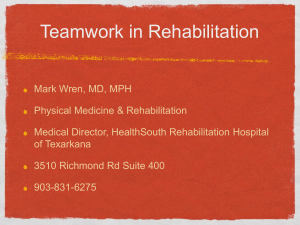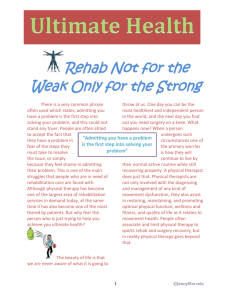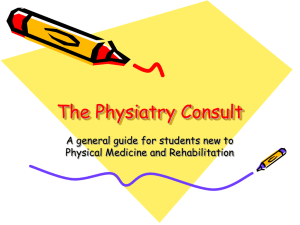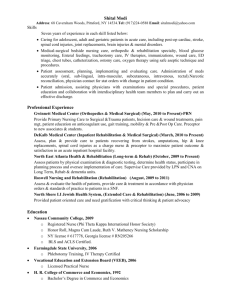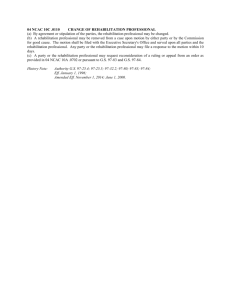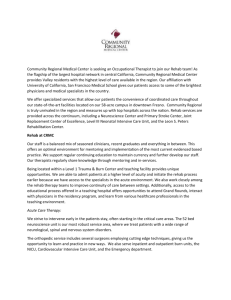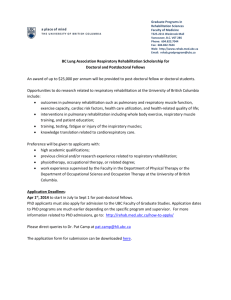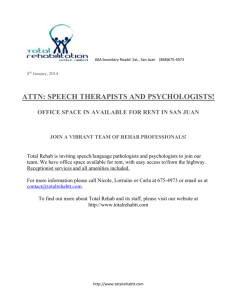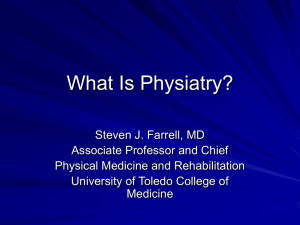National Statement on Ethical Conduct in Research Involving Humans
advertisement
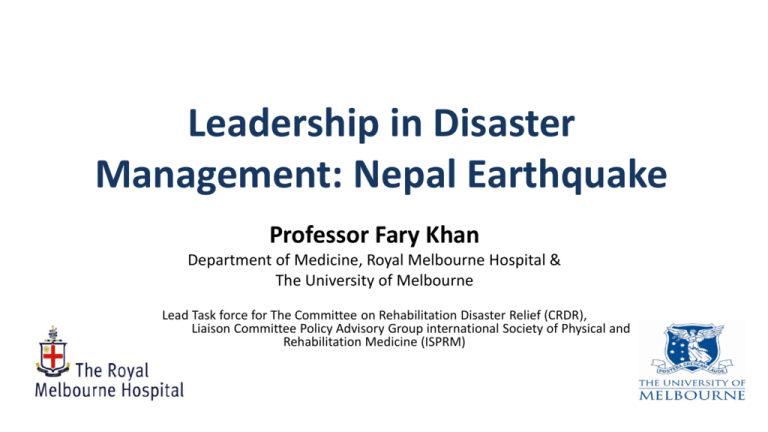
Leadership in Disaster Management: Nepal Earthquake Professor Fary Khan Department of Medicine, Royal Melbourne Hospital & The University of Melbourne Lead Task force for The Committee on Rehabilitation Disaster Relief (CRDR), ISPRM WHO Liaison Committee Policy Advisory Group international Society of Physical and Rehabilitation Medicine (ISPRM) 1. The Problem Inter-Agency Standing Committee’s (IASC) Cluster System -global authority for crisis coordination & accountability - WHO - the Health Cluster Demand for better coordination and control after major international disaster/crisis. • poor clinical competence of providers • unacceptable clinical & management practices • limited scope of guidelines for foreign medical teams (FMTs) [Global Health Cluster: coordination and registration of FMTs in Humantarian disasters. Strategy position paper. Geneva 2011] ELRHA: Enhancing Learning & Research for Humanitarian Assistance I: Registration, coordination & internal quality improvement of FMTs II: Professionalize training & certification of humanitarian health care providers & accreditation of their academic training centers & trainers 2. Foreign Medical Team Requirements • Professional & ethical standards • Accelerate deployments • Match services with supply & demand • Create register of FMT provider organizations • Team composition by specialty, experience & bed capacity • Standardized data collection & reporting • Procedures performed by accredited staff • FMT staff- experience in humanitarian settings • Process to supervise less experienced [GHC Concept paper 2011] Rehabilitation Competencies -HHI Humanitarian response- needs both trauma surgery & Rehab Early rehabilitation restores function, improves survival & QoL Rehabilitation for disabling injuries: wounds/ trauma, amps, SCI, TBI, burns Prevent complications in pw disabilities & disabling injuries, assistive devices Partnerships with community services & CBR for post-operative care & Rehab Identify need for psychological services [Sphere Minimum Standards, IASC Global Health Cluster FMT-WG Health Services Checklist] Why is this needed? Specialised field HR DM - comprehensive med rehab Ax Interdisciplinary approach - acute, com & care coordination Needs’ ax- patient complexity & follow-up Local & rehabilitation staff training in PM&R Ensure global & a longer-term approach 3.Nepal Earthquake 2015 4. Rehab FMTs- composition, specific focus, selffunded, independent, partnerships Team Leader Response • • • • • • • • FMT registration with WHO- liaise with rehab sub-cluster Daily surveillance reports & Exit reports for MoHP Support desks at the airport- triage critical patients, basic initial symptomatic management, referral- public hospitals or FMT Medicine/Equipment Custom Release Help Desk - speedy release of drugs & medical equipment brought in Management of dead bodies - National Emergency Operation Center (NEOC), MoHP– if required Post Earthquake Hospital Based Disease Surveillance Trauma, ARI, watery diarrhoea, bloody diarrhoea, fever, total OPD patients, total IPD patients & total surgical cases (minor/major) Post-Earthquake Disease Outbreak Surveillance- community Logistics support- medicines, tents, water, transport, supplies etc. Considerations • Logistic cluster- no rehab physicians, few nurses, AH- be flexible/adapt as needed • Contact for Medivac, FMT-CC, Exit strategy • National CBR plan- physical, assistive devices, psychosocial, shelter, transport etc- work with partners, other stakeholders • Gender issues • Safety /security situation • Environmental issues- H2O, sanitation, landslides • Coordination & reporting • Road access • IDP situation Leadership • • • • • • • • • FMT recruitment, coordination, training etc Team capacity building - local +FMT Rehabilitation processes & organisation- liaise local team Triage & prognosis (based on ASIA scores) General ward set-up for operational ease Models of care- CBR + partnerships Systems of management of referrals, acute & CBR Medical documentation & record keeping Need for evidence-based practice Field Conditions • Logistics & security frame work • Set up of local partnerships to operate in the best legal conditions possible • Transport & access to trauma care units with a clear mandate & visibility prepared by the organization • Formulated terms of reference that describe the task required for the PRM team Personal skills • • • • • • • Good organizational skills A resilient mindset & attitude - working environments Prioritize personal security Operational & logistical procedures Flexibility to cope with varying workloads & requirements Cultural sensitivity Ideally- speak the local language Activity Plan- outcomes Discussion with local team re FMT expectations Local unit priority- patient triage tool developed Gaps identified – Lack of rehabilitation processes, documentation, treatment approaches & systems of care – Integration with acute hospital (minimal documentation with patient transfers) – Limited resources/staff/IT Specific request for teaching on rehab management Clinical issues (SCI n=101) Traumatic SCI • Fracture management/bracing/ASIA scores Disability management • General medical stabilization, CCs • Spinal shock, resp compromise, AD, paralytic ileus, neurogenic bladder/bowel, HO etc • Pain & spasticity care • Mobilisation program/precautions • Contractures & complications of immobility • Closed head injury (concurrent if relevant) • Diet, falls, pressure care etc Gaps Rehabilitation Medicine capacity, limited imaging & pathology Lack of • access to timely neurosurgical advice following spinal surgery • electricity , beds (patients in corridors, even prior to 13th May EQ) • procedural training for volunteers • emergency packs in case of evacuation • Glucometers, urine dipsticks, packaged saline for washing wounds • Hand hygiene- disinfectant for staff/patients/visitors Orthotics - more tools needed; no prefabricated devices More supplies: gloves, dressings, tweezers, staple removers, torches Appropriate wheelchairs & seating, pillows & pressure mattresses Lessons Learnt ISPRM -WHO Min Standards & Recommendations for Rehab in Emergencies: Guidance Document for FMTs Requirements for: • FMT staffing configuration • Standards for rehabilitation in outbreak response • • • • • • Disability inclusive response & accessibility Deployment Patient assessment & data collection Referral & coordination mechanisms Rehabilitation equipment & resource requirements Research & development Thank You fary.khan@mh.org.au Ackowledgements Jim Gosney Frederick Burkle III DoHP Nepal WHO rehab sub-cluster Host - Amatya Family
